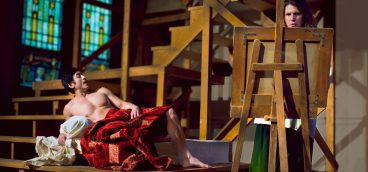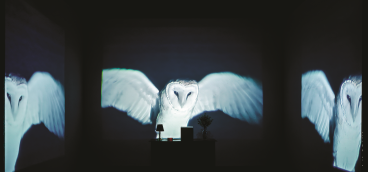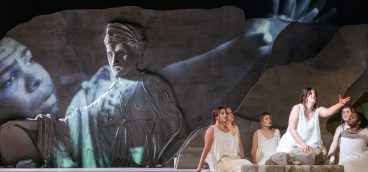Theater Roundup: Barebones and Kinetic Kick Off Strong Summer Season
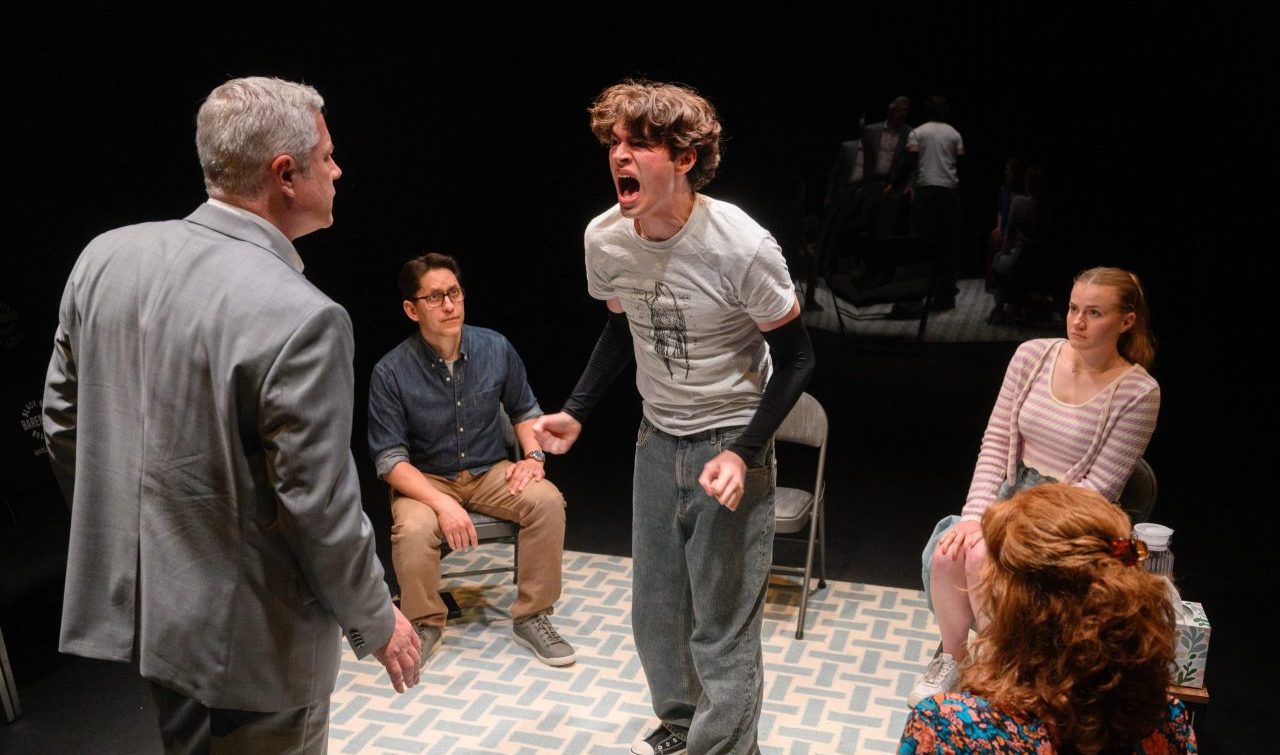
One of the greatest joys in attending a theatrical performance is not knowing anything about the show beforehand. This blessing is generally squandered by reviewers who extol plot explication above all other critical duties. Thus, I am torn in describing two excellent shows currently running in Pittsburgh: Barebones Productions’ “The Animal Kingdom,” and Kinetic Theatre Company’s “A Life in the Theatre.” I would rather say “just see these productions,” than explain why you should see them, but then, that really wouldn’t be fair. It would mean taking my word on faith, and faith in any form is such a cynical concept these days – faith in politics, faith in religion, faith in culture. But perhaps I can appeal to one of these in which we have a sympathetic interest, for as Oscar Wilde said, “Criticism makes culture possible,” and the goal of this column is simply to help make culture if not more possible, then more viable, in Pittsburgh.
Although their subject matter is diverse, these plays have much in common. Both run for about 90 minutes without intermission. Both are episodic instances in the lives of the characters portrayed. And both explore the dilemma of how younger people communicate with older ones.
We see in “The Animal Kingdom” a family attend counseling sessions with a collage-age son who is dealing with depression and trauma, and in “A Life in the Theatre” we watch two actors backstage and onstage deal with existential angst and professional jealousy. Both examine conflict that is primarily unspoken, and in each, the act of speaking is an act of transfiguration.
Ironically, these plays were written early in the careers of their respective playwrights: “The Animal Kingdom” (2022) is by the British writer Ruby Thomas, while “A Life in the Theatre” (1977) is by the quintessentially American David Mamet. Seeing them in the same weekend, as I did, proved to be an illuminating experience, as both are “black box” productions – meaning they are performed in simple, square, unadorned theatrical spaces. But while “The Animal Kingdom” is purposefully claustrophobic in order to invoke the intensity of a clinical setting, “A Life in the Theatre” is resolutely expansive, as if to underscore the maxim “All the world’s a stage,” or in this case, the stage is all the world, at least for these two people, who are actors, portraying characters, who are actors.
Director Patrick Jordan has the audience of “The Animal Kingdom” literally abutting the performance space on three sides. If you’ve ever wanted to sit in on a group therapy session this is your chance. It’s a bold choice and it works, doubling down on the intensity and allowing the actors to emote with as little nuance as they might ever dare, short of film work. Greyson Taylor as Sam — a college kid in the throes of a mental crisis – manages to carry the play convincingly, although I’m not sure he trusts himself enough yet to convey more by what he doesn’t evince than by what he does. Also excellent are Daina Michelle Griffith as the intrusively truculent mother (Rita), Darren Eliker as the taciturn father (Tim), Juan Rivera Lebron as the anodyne counselor (Daniel), and Alexandra Casey as the conflicted sister (Sofia).
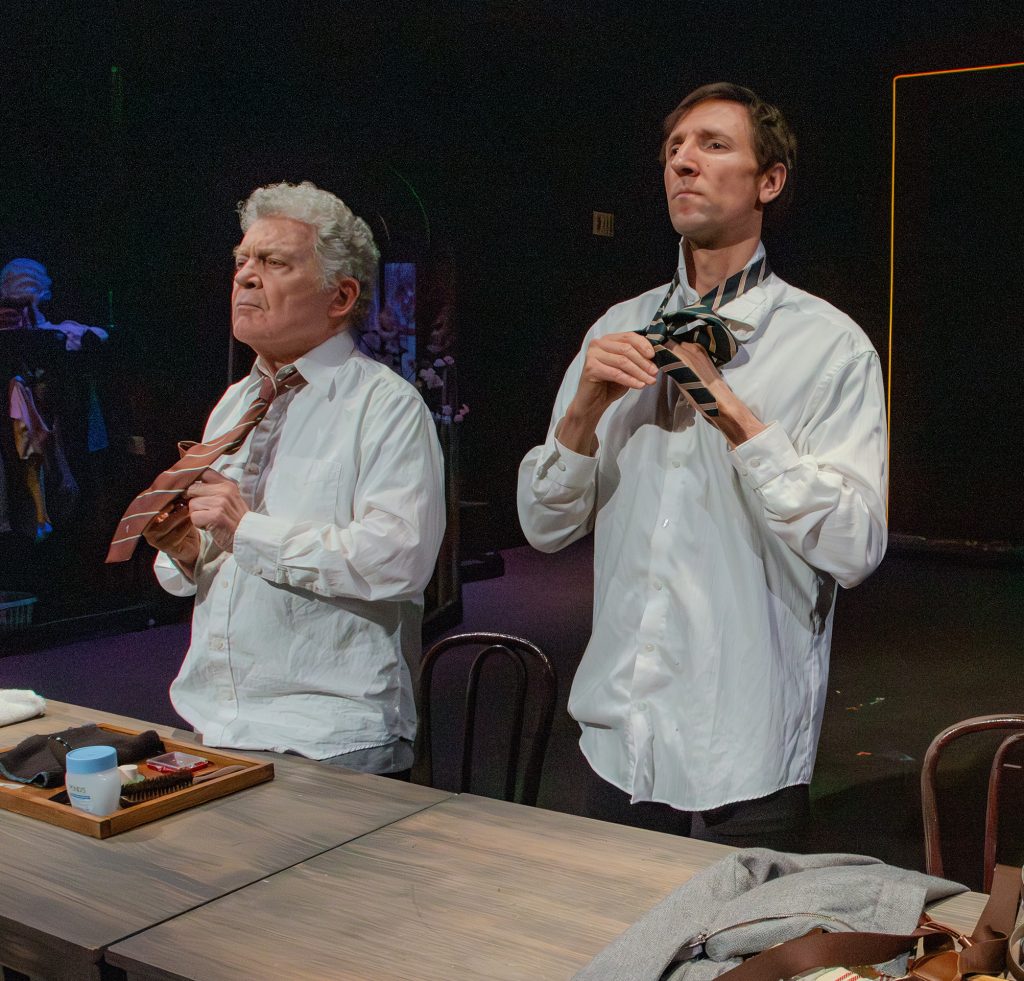
You can surmise by these descriptions that the personalities are all approximations of archetypes. I would have preferred to see a bit more risk and originality in the playwright’s character constructions (the misunderstood son, the laconic father, and the shrewish mother are all timeworn, safe bets), and less hammering of obvious sentiments — Sam yells out four or five times that he is “queer, not gay” — but I am sure that such predictable tropes will be eschewed after further writing experience.
However, it’s what the actors do with the material that counts, and this production has some of the strongest dialogue melding I’ve ever seen. The overlapping and interweaving of conversation strands ring true and are utterly impressive.
As to Mamet’s “A Life in the Theatre,” there are only two characters, but they inhabit multiple roles spread over 26 scenes, and we never really know if they are acting just on stage, or performing in life as well.
Director Andrew Paul daringly utilizes the expansive space of the Rauh Studio Theatre without compressing it in any way. We see the theater unadorned with minimal sets, and the outline of a proscenium arch, as if we are confronting an imaginary audience directly in front of us. Thus, the actors are facing the opposite direction when they are onstage, and looking at us when they are off. Kinetic used a similar conceit in its 2022 production of “The Illustrious Invalid,” causing viewers to question, in both cases, what they are seeing through the metaphoric looking glass – is it life or a mere reflection? (Correspondingly, the wall facing the audience in “The Animal Kingdom” is literally a mirror).
The action follows Robert (Sam Tsoutsouvas), an aging actor, and John (Joseph McGranaghan) a young actor, through an array of scenes, or vignettes – they could be micro plays, really — over the course of several seasons in an anonymous dramatic company. They are like two Samuel Beckett characters who have no lives other than their moment-to-moment existence: they live perpetually between clock ticks in the dream world of the present. (In fact, the clock on the wall never moves). They banter as they apply make-up, dress and undress, and even when they are onstage, as if they don’t want to admit that their private lives ever cease, even when they are inhabiting their stage lives. This conjures the deep irony of the title, because there is no room for a life in the theater when you are so metaphysically hollow that you are acting your way through your real life.
Although the playscript is laced with comedy — and both actors are acutely funny — none of the laughs are arrived at cheaply; it’s the kind of humor that really works because there is, behind these masked souls, so much repressed pathos. Robert and John check into their jobs every day with a timesheet, just like factory workers, and just like Vladimir and Estragon check into their banal existences every day in Beckett’s “Waiting for Godot,” a play that Mamet often finds resonance with.
We are left, at the end of both of these works, with the kind of denouement that is more implied than stated, and thus all the more moving. Go see both, and you won’t be disappointed. But don’t listen to me as a critic, just take it on faith.
THE ANIMAL KINGDOM continues through June 30th at the Barebones Black Box Theatre, 1211 Braddock Ave., Braddock, $40-50. www.barebonesproductions.com
A LIFE IN THE THEATRE continues through June 30th at the Richard E. Rauh Studio Theatre, University of Pittsburgh, Oakland, $20-55. www.kinetictheatre.org
Please note: although The Hamlet Machine column will be on vacation for the next two months, make plans now to catch these upcoming shows from both companies: Kinetic’s “Oleanna,” another strong David Mamet play, will run from July 11-28th, and Barebones’ highly anticipated “Crocodile Fever” by Meghan Tyler will be opening in October.



